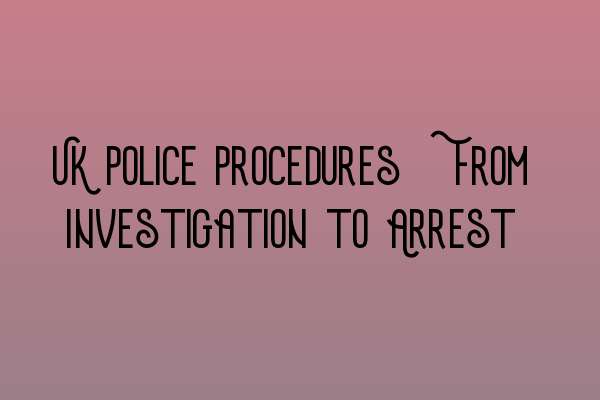UK Police Procedures: From Investigation to Arrest
When it comes to criminal law in the UK, understanding police procedures from the initial stages of investigation all the way through to arrest is crucial. This knowledge not only benefits aspiring solicitors and legal professionals studying for the SQE Criminal Law exam, but it also provides valuable insights for individuals seeking to comprehend the inner workings of the criminal justice system.
The Investigation Process
The investigation phase is the starting point for any criminal case. It involves gathering evidence, conducting interviews with witnesses and suspects, and analyzing the available information. This crucial stage determines the direction of the case, and its success heavily relies on the thoroughness of the investigation techniques employed.
During the investigation, a comprehensive understanding of criminal laws and procedures is essential. Keeping up with the latest updates in the UK criminal laws is highly recommended. For more information on this topic, check out our related article Updates in UK Criminal Laws: Staying Informed and Prepared.
Arrest Warrants and Police Powers
Once the investigation stage progresses, and the police have gathered sufficient evidence, they may seek an arrest warrant from a court. This warrant grants them the legal authority to arrest the suspect. Understanding the criteria for obtaining an arrest warrant and the police’s powers during an arrest is crucial for legal practitioners and anyone interested in the intricacies of criminal law.
If you’re seeking to enhance your knowledge of arrest warrants and police powers, we recommend attending our Workshops and Seminars on Criminal Practice: Expanding Your Expertise.
Procedure at the Time of Arrest
When an arrest occurs, the police must adhere to specific procedures to ensure that the suspect’s rights are protected. This includes informing the person being arrested of the reason for their arrest, cautioning them that anything they say may be used against them, and providing them with access to legal representation.
To fully comprehend the intricate details of the procedures followed at the time of arrest, check out our article on Decoding Criminal Evidence Rules: A Detailed Analysis.
Supporting the Rights of Victims
While understanding the rights of suspects is essential, it is equally important to acknowledge and support the rights of victims in criminal procedures. Victims often require legal protections and support throughout the entire criminal justice process, from investigation to trial and beyond.
For more information on ensuring the rights of victims and the legal protections available to them, visit our article: Ensuring Rights of Victims in Criminal Procedures: Legal Protections and Support.
Continuing Your SQE Criminal Law Study Group Experience
If you are studying criminal law for the SQE exam, consider joining a study group to enhance your learning experience. Collaborating with fellow aspiring solicitors can provide valuable insights, help clarify complex concepts, and foster a supportive environment.
To learn more about enhancing your SQE Criminal Law Study Group experience, read our article Enhancing Your SQE Criminal Law Study Group Experience.
In conclusion, understanding UK police procedures from investigation to arrest is instrumental for legal professionals and individuals interested in criminal law. By staying informed about updates in criminal laws, attending workshops and seminars, decoding evidence rules, supporting victim rights, and enhancing your study group experience, you can ensure a comprehensive understanding of the intricate processes involved in criminal procedures.
